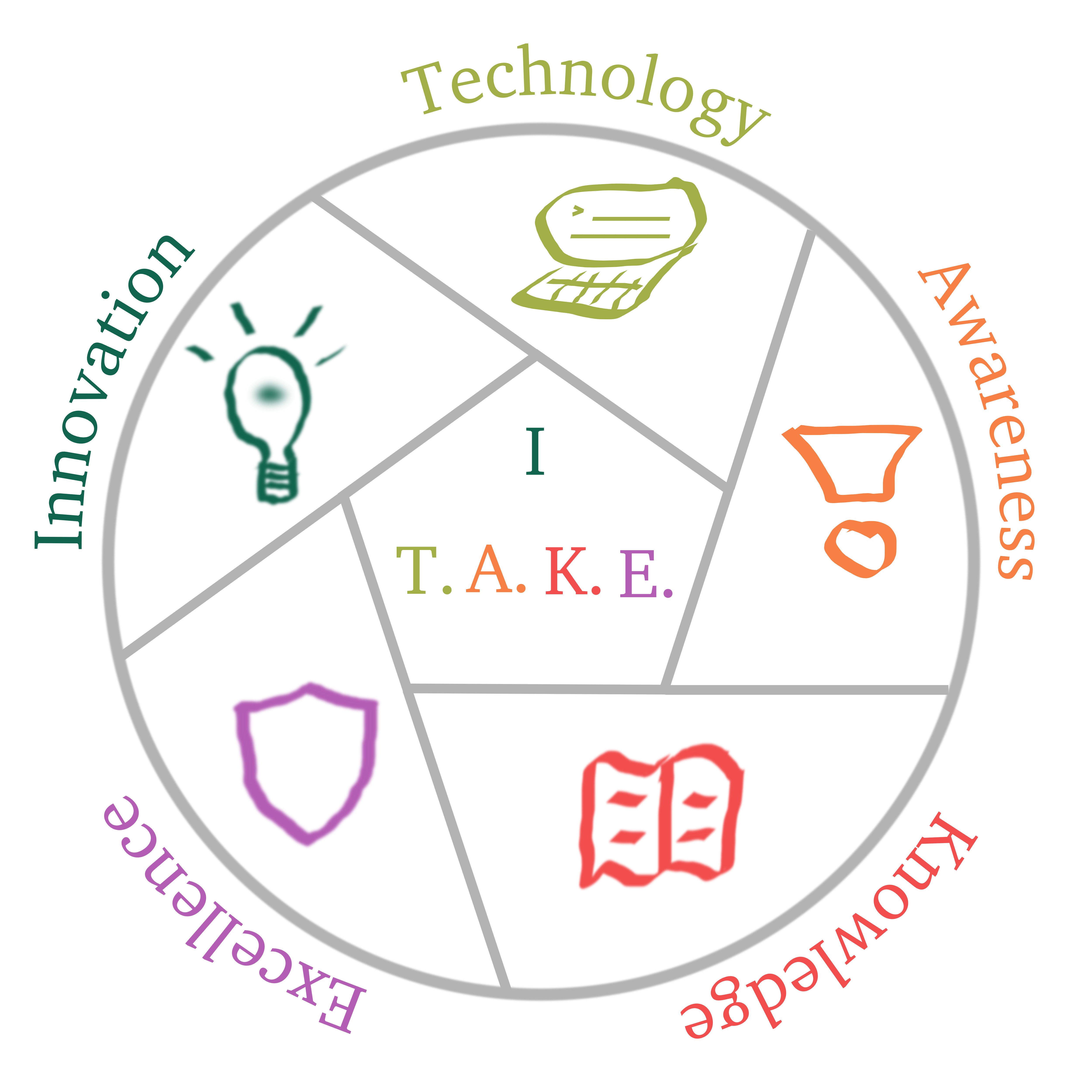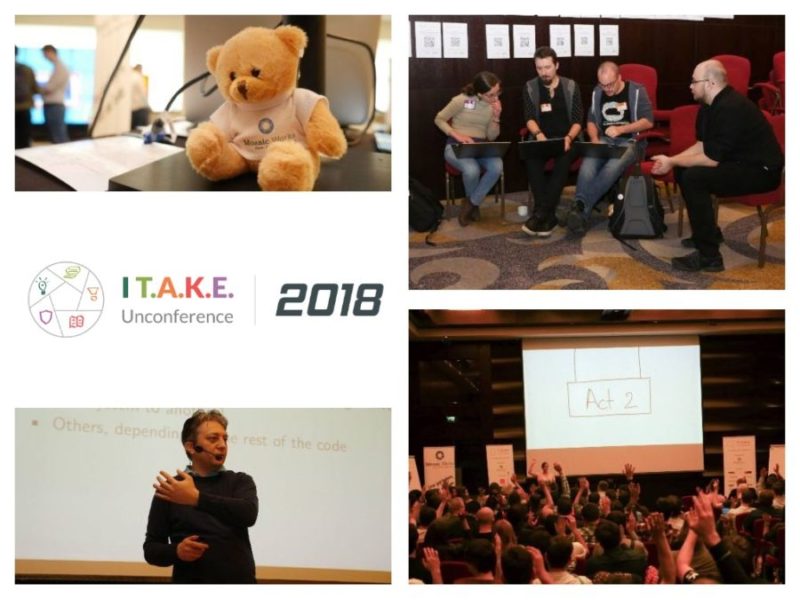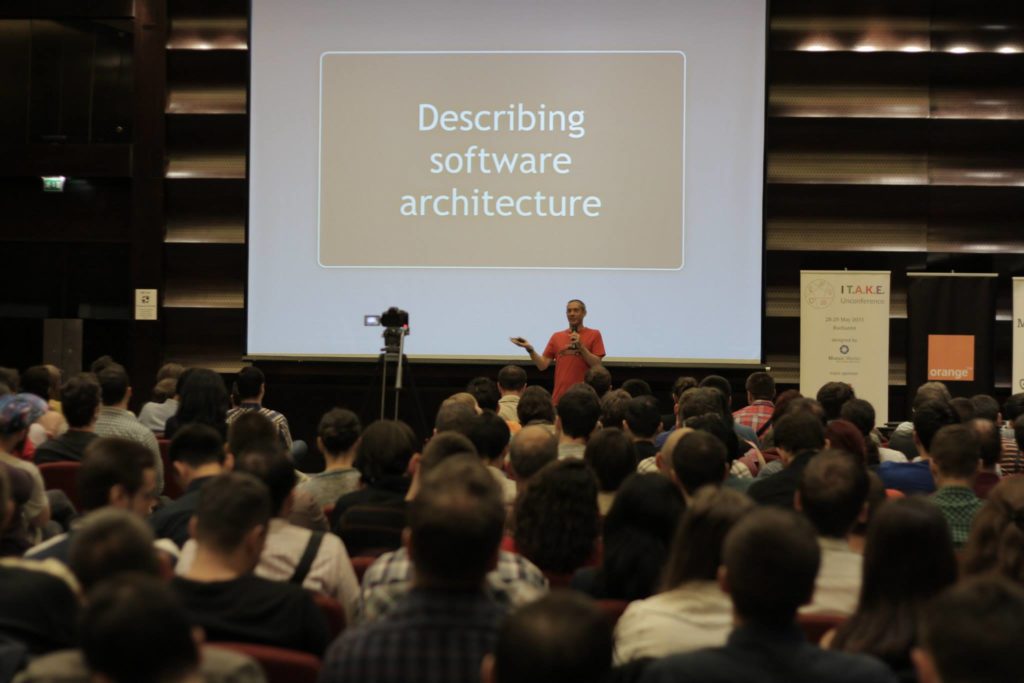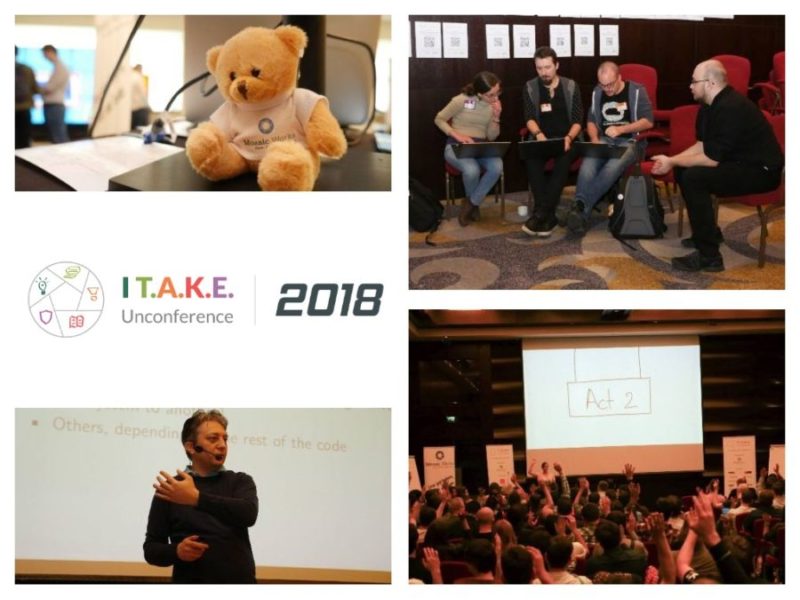 Announcements
Announcements
I T.A.K.E. Unconference 2018 Slides & Videos
You can check out this year’s videos here, on our Youtube Channel.
DAY 1
Alexandre Bauduin – Automation, Aviation Authorities and Mission Critical Software
Bart Szulc – Test Coverage 2.0
Lemi Orhan – Git Anti-Patterns
Johan Peeters & Michael Boeynaems – REST Identity and Access Management
Armagan Amcalar
- console.log(brain)
- http://github.com/dashersw/brain-bits
- http://github.com/dashersw/wits
- http://github.com/dashersw/brain-monitor
Alastair Smith – Check That: How a List Can Save Your Life
Philipp Krenn – NoSQL’s Fight for Security
DAY 2
Alexandru Bolboaca
Bart Szulc
- Finding Bugs Before Implementation – part I
- Finding Bugs Before Implementation – part II
Daniel Carral
- What is Good Code? Evaluating Code Quality – slides
- What is Good Code? Evaluating Code Quality – Github repository
David Voelkel
- Fake It Outside-In TDD Workshop – slides
- Fake It Outside-In TDD Workshop – illustrating screencasts
Alin Pandichi – Incremental Feature Development with Web Components
Henk Boelman
- Unleash Some AI into the Wild – slides
- Unleash Some AI into the Wild – Tendocare.ai video
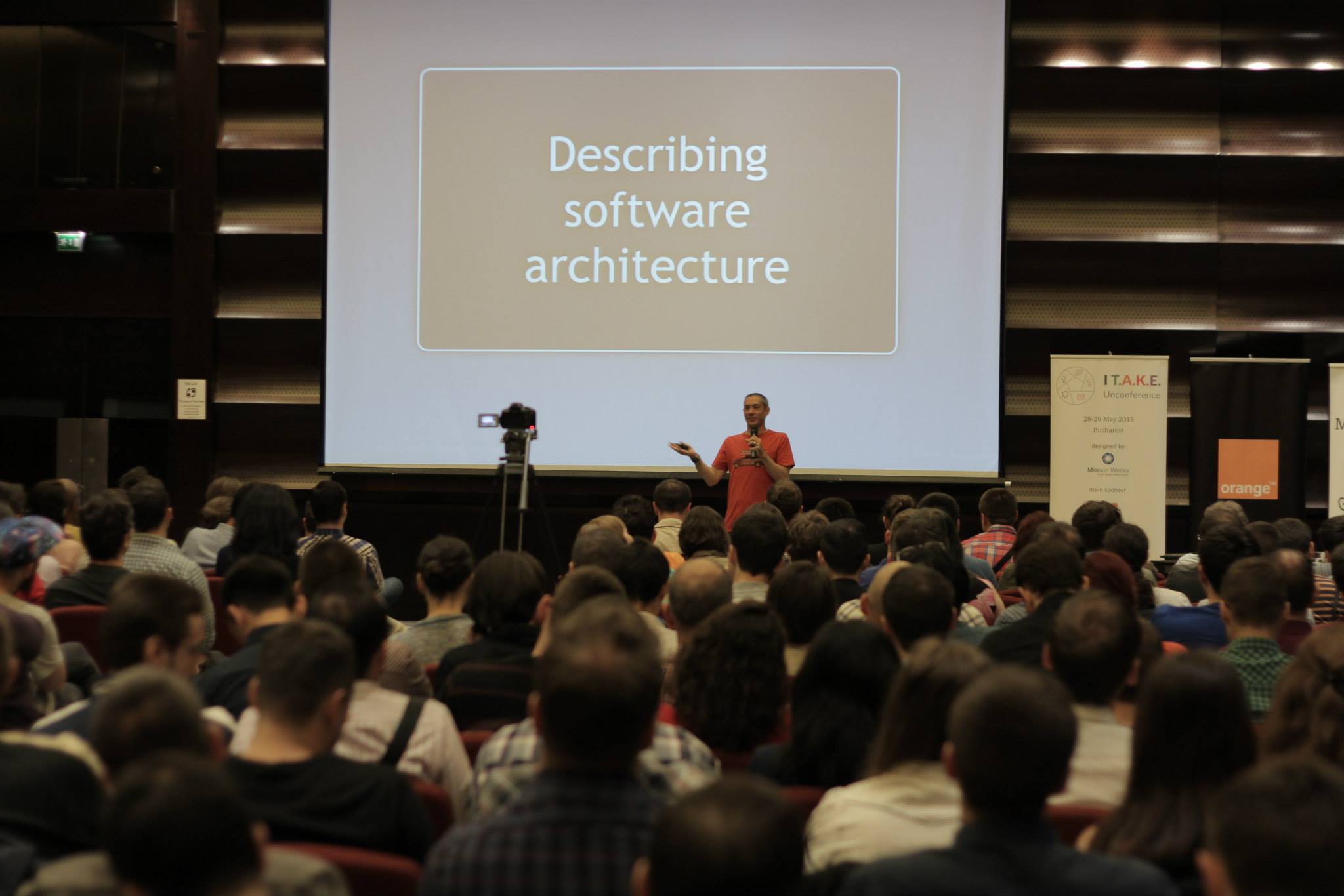 Tips
Tips
5 things to consider when you submit a session abstract
If you are an experienced software craftsperson, but you are new to the international stage of speaking and teaching, here are 5 recommendations to make an attractive session abstract for the audience of I T.A.K.E. Unconference.
#1. Get into the attendees shoes
If you have a very clear idea of who your audience is going to be, make the exercise to think from their point of view. They choose to attend your session, and they expect the best value from their investment.
So, here are 3 things to consider:
- what do you think is going to drive their attention
- what is that thing they will remember
- and apply in their daily work
#2. Customize, customize, customize
Every audience is unique, so craft your proposal according to what you know about your audience and about the event. Try to bring an original approach for each session you submit.
As organizers, we encourage the speakers to have a clear goal for their session. Another essential aspect is to both inspire the audience and send them to a new path. With your session you influence people so that they could adopt a different strategy or improve right away their work, and why not, their daily life.
#3. Pay attention to details
When you apply, make sure you have an excellent title, a clear description of what you want to present and a strong personal bio.
Make sure your title is not generic. Don’t use “Unit Testing” as a title for your workshop. You do not have enough time to teach unit testing in 90 minutes. Try something like “Unit Testing Crash Course” if it is for beginners. If you designed a workshop for an intermediate audience try something like “Unit Testing: stubbing techniques on functional languages”.
The title is strictly connected to the topic of your session. Too often the session title says something different than the content of the abstract. For a title like “Test Driven Development for beginners” we would expect to hear about Evolutionary Design. If you have such a title and you want to teach an unit testing crash course and not Evolutionary Design, then use the appropriate name and change the title to “Unit Testing Crash Course”.
An attractive title that can be intriguing can catch reviewers eyes as well. Instead of using “Unit Testing Crash Course” you could try “Keep your job: learn unit testing now!”
#4. Invest time in your application
Although it might seem at hand, making a proposal takes time. Make sure you follow the guidelines offered by the organizers and when in doubt, ask for more details. Make sure you offer the details requested in the application.
Pitch an interesting subject, and valuable take aways. The audience is at your session to learn about new interesting ideas and concepts.
#5. And a little extra thing
You’ve seen the call, you got your information in order and you are pretty sure you want to make a submission. In this case, we strongly advise you to make an early submission. In many cases, you will be able to obtain feedback from the organizers. This means you will be able to improve your proposal and increase your chances to be on the speakers list.
Take a step forward and share your knowledge: new ideas, opportunities and glimpses of where the future of the technology lies are needed to challenge and to improve the daily routine. Looking forward to hear more about your proposed sessions!
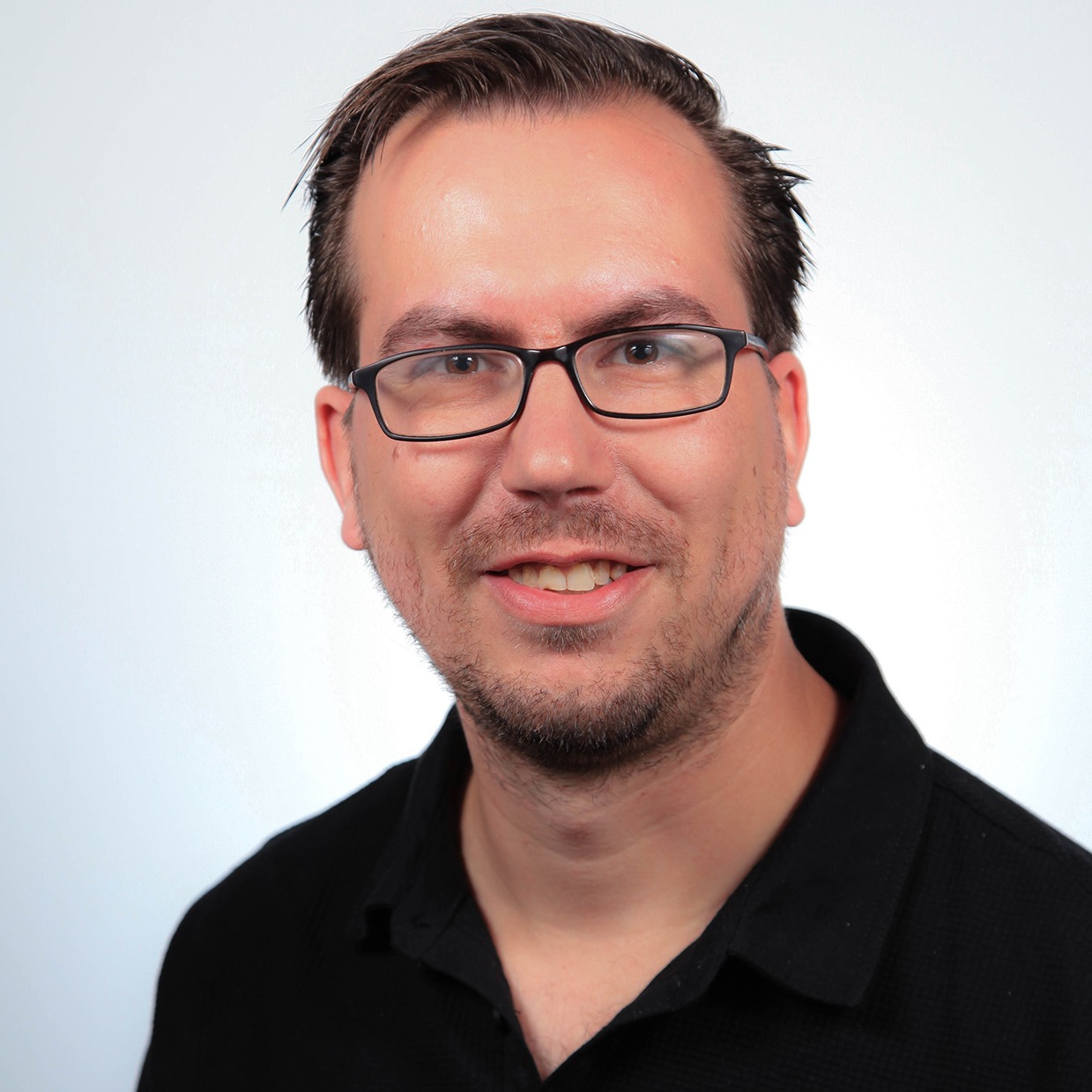 Announcements
Announcements
[Video] Henk Boelman – Unleash some AI into the wild
Want to know more about Unleashing some AI into the Wild? Here we have a short teaser from Henk Boelman.
He started out as a software developer in the late ’90s and later moved on to the role of architect. He now guides organisations in their cloud adventure, with a strong focus on cloud native software development.
Watch the teaser of his keynote presentation!
Other videos:
Alexandre Bauduin – Automation, Aviation and Mission Critical Software
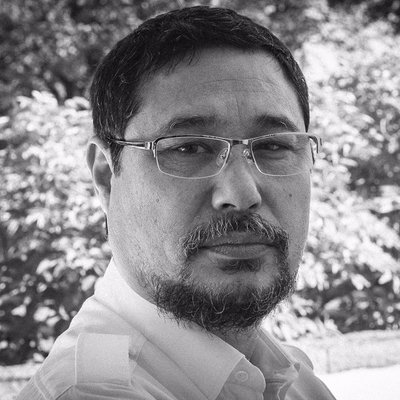 Announcements
Announcements
[Video] Alexandre Bauduin – Automation, Aviation and Mission Critical Software
Enjoy the following series of videos from the speakers, top-notch software crafters from across Europe and USA, from innovative organization and industries, joining I T.A.K.E Unconference, Bucharest, 7-8 June.
Alexandre Bauduin is a former evaluation pilot Boeing 777, certification engineer, software developer, context driven tester and inventor. His career started in the space industry where he discovered his passion for aerospace, working on both military and civilian projects.
Always fun for Alexandre to use an oscilloscope, an ARINC bus analyzer, step into assembly language or stall a Boeing 777!
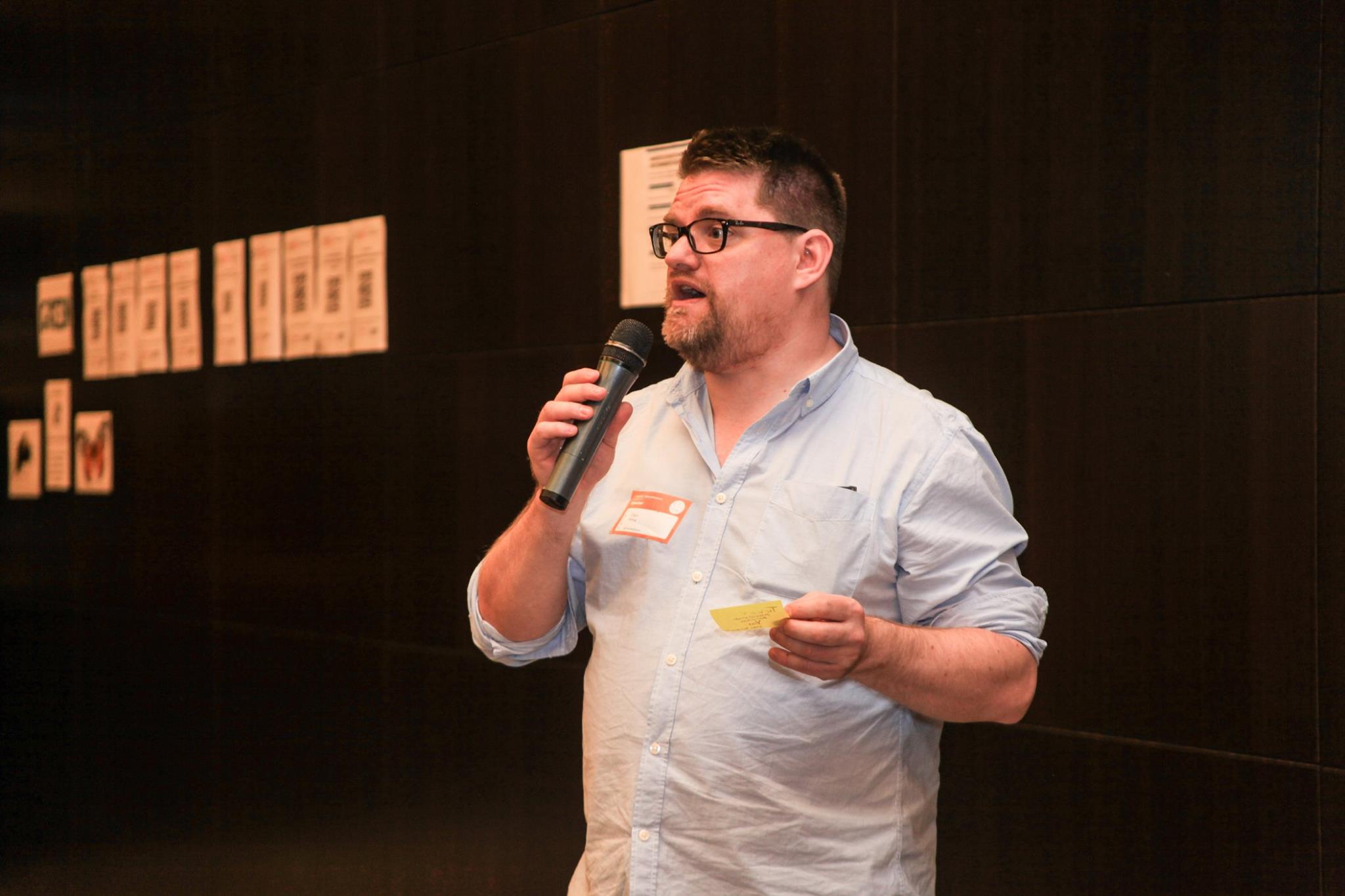 Testimonials
Testimonials
Daniel Billing’s experience as keynote at I T.A.K.E Unconference 2017

When learning new things, ideas, skills or exploring new perspectives, the image above reflects how I am feeling when I am trying to assimilate and process all the activities I take part in within the testing community. It’s that beautiful and terrifying moment when you are flying and the sun is ablaze on the horizon. It’s knowing you’ve learned a lot, but there is so much left to learn. Perhaps a move one way or another will lead to failure, but as long as you are quick to learn from those mistakes you can be on a well-lit path again.
Over the last month or so I’ve been attending a few events, including I T.A.K.E. Unconference in Bucharest, Romania, Let’s Test in Stockholm, Sweden and Nordic Testing Days in Tallinn, Estonia. Each of these events offered something new and different for myself as a contributor to those events. However, it is the other aspects of what they provide that are important.
I T.A.K.E. Unconference
I T.A.K.E Unconference was my first time giving a Keynote talk at a conference. This was a huge honor not just to be asked to give a talk, but also the fact that it wasn’t a testing conference. I T.A.K.E. Unconference is a developer conference. Every attendee is highly technical, lives and breathes the code they write and the tools they use. It made me realize that whilst I have spent a lot of time learning about security, there is so much else to learn. Especially about how developers learn and work, and how applications are crafted.
I spent hours talking about how to build good environments for testing using tools like Docker and Heroku, or exploring how developers think about testing. A lot of it is about unit testing, some of it is about automation. But there are a lot of developers who understand the value of good testing and want to work with testers to make it happen. There is a lot we can do better to support them in this endeavor. These are things we should be doing at Medidata…testing cannot happen or exist in a vacuum.
Yes, there were those that think the role of testing or testers is now defunct, where a technical person can achieve all things they need to on a project. It was interesting to be able to discuss and challenge some of that thinking, where a tester can be a specialist or advocate for testing on their project; rather than someone who executes tests, gathers test results and creates endless meaningless reports. I’m not saying reporting is bad, just the doing the wrong reporting is bad, and unhelpful. It doesn’t add value, nor does it explain to those who don’t test what the value of the testing is.
I T.A.K.E. is a hotbed of software craftspeople. People who want to build and develop great software for their customers and clients. The best talk I went to while I was there was one of the other keynotes. Felienne Hermans, of the Netherlands, gave a talk called:
What is science? On craftsmanship for children
This reflected on her approaches to teaching coding to children. Children learn predominately through play, exploring their environment, and asking questions. It’s something that adults have largely forgotten how to do, or if we haven’t has become more formalized. We’ve turned play and learning into work instead. We can make our learning far more creative through events such as hackathons. We should review, model and landscape our applications inside the environment we are working in. Children do this far more naturally than (some) adults.
Read the full article here.
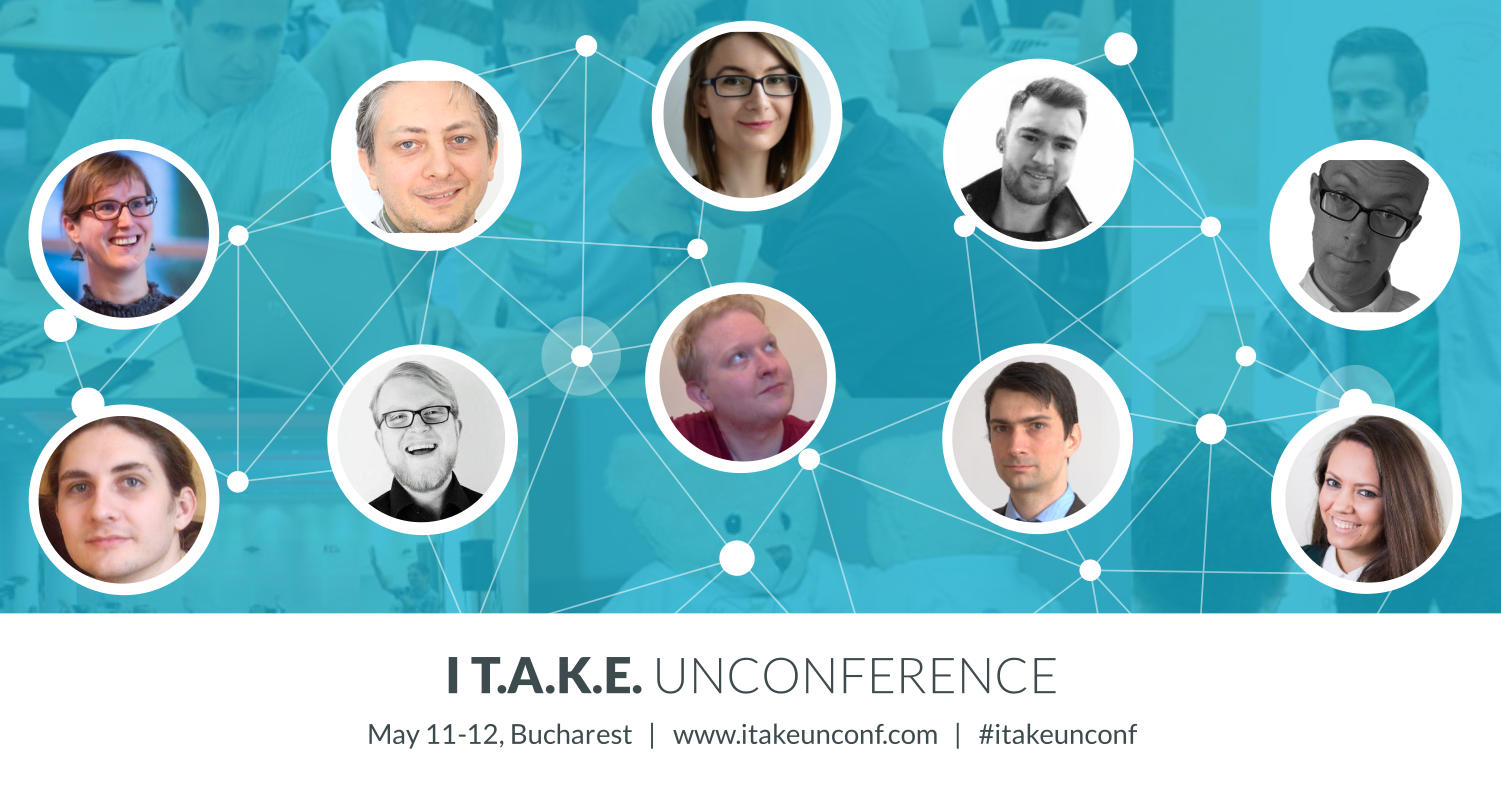 Announcements
Announcements
I T.A.K.E Unconference 2017 – IInd day slides & videos
And…it’s a wrap: 2 days of intense & complex program, 300 international participants, more than 35 sessions & more than 35 speakers from United States, Europe and Asia. During the 2nd day of the event, 15 speakers from 10 countries shared their knowledge on Machine Learning, IoT, Evolutionary Design, Documentation for Software Developers, Impact Mapping and more.
Videos are available here. Find below the presentations from day 2. The slides from day 1 are here.
Romeo Kienzler – Realtime- Cognitive IoT using DeepLearning and Online Learning on top of ApacheSpark Streaming and Spark enabled DL frameworks (keynote)
Dan Billing – Testing or Hacking: Real Advice on Effective Security Testing Strategies (keynote)
Eduards Sizovs – Beyond Software Craftsmanship (keynote)
Dan Serban – Introduction to Apache Spark
Jakob Holderbaum – Managing Shared Secrets with basic Unix tools
Florin Coros – Decide between In-Process or Inter-Processes Communication at Deploy Time
Peter Kofler – Brutal Coding Constraints
Joe Wright – Tackling 16 years of legacy code with mob programming and Lego
Alin Pandichi – Covariance and contravariance. Say what?!
Patrick Baumgartner – Impact Mapping Workshop
Liviu – Stefanita Baiu – Journey to Agilandia – a BA Travel Kit
More slides and videos from day 2 coming soon
 Announcements
Announcements
I T.A.K.E Unconference 2017 – Ist day videos & slides
The first day of I T.A.K.E Unconference 2017 was a great success: 15 speakers from 9 different countries shared insights and latest trends on 5 different stages.
Live coding sessions, the talks & workshops received an excellent feedback. Also, everyone got involved during the Open Space, Lightning Talks, Product Development Track & Kata Lounge. In the evening, the event continued informally at Dinner & Coding with a stranger.
Videos are available here. Find below the slides from day one. Slides from day 2 are here.
Felienne Hermans – What is science? On craftsmanship for children (Keynote)
Gerard Meszaros – It isn’t testable until it’s tested (Keynote)
Phillip Krenn – 360° monitoring of your microservices & Se7en deadly deployment sins
Martin Kodok – Powering Interactive Data Analysis with Google BigQuery
Diego Lemos & Vlad Stoian – Extreme Carpaccio: slice thin, code fast!
Thomas Coopman & Michel Grootjans – Playing with projections
Opher Vishnia – Building a multiplayer game server and keeping (most of) your hair
Vlad “Reign” Zelinschi – Progressive Web Apps – The Future
Alexandra Marin – Mobile design patterns
More slides and videos from day 1 coming soon
 Announcements
Announcements
Covariance and contra variance. Say what ?!
Enjoy the following series of interviews with the speakers, top-notch software crafters from across Europe, joining I T.A.K.E Unconference, Bucharest, 11-12 May. Discover the lessons learned and what drives them to challenge the known path in their field.
Alin Pandichi, Software Developer at MozaicLabs and facilitator of the monthly Coding Dojo meeting that is part of the largerBucharest Agile Sofware Meetup Group, will share during his talk at I T.A.K.E Unconference more about Covariance and contravariance.
#1. Please share with us 5 things you did that helped you grow & become the professional you are today
I’ll answer this with a little bit of story telling about how I became a software developer. The first two things that helped me were attending the computer science oriented high school and college. There, I learned the basics of computers and programming languages. I also noticed how effortlessly I was solving CS related problems, so maybe I was onto something.
Number three: I got my first job straight out of college, developing a Swing rich client application saving data with JPA. This put me face to face with real world problems. I was faced with the fact that continuous learning is a must in this industry.
Therefore, number four on the list is learning. For the first few couple of years, I kept devouring every Java-related article I could find on DZone. With each one, I found out something new: a useful tool, a Linux terminal command, a development methodology, etc.
Last, but not least, is getting involved with local software development communities. I started attending meetups such as The Bucharest Agile Software Meetup Group and the Bucharest Java User Group. Gradually, I became an active member of both, giving a helping hand in organizing their events. On top of that, I also got involved in the wider community of Global Day of Coderetreat. My talk at I TAKE 2017 is one of the occasional opportunities I get to share what I know.
#2. What challenges will the participants find solutions to during your session at I T.A.K.E Unconference 2017?
They will find it easier to understand the concepts of covariance and contravariance, and how they are applied in the world of programming. In my experience, it was very easy to forget what these two words meant. Not anymore.
#3. Recommend for the participants 3 sources you find inspiration from and would help them better understand you
I dream big, so my biggest source of inspiration is science fiction. My first serious SF encounter was with Frank Herbert’s Dune series. Out of the contemporary authors, I enjoy Neil Gaiman’s work very much.
Whenever I get a chance, I tune into Nick Francis’ podcast called Quiet Music. It is a blend of low beat music of various genres: electronic, jazz, instrumental, folk, light rock, and so on.
Cinema is one of my other hobbies. I am very much interested in following every film festival happening in Bucharest. Also, the Romanian cinema of the past two decades has offered many gems so far, and it continues to do so.
Want to join Alin and ~300 software crafters from around Europe?
Register now for I T.A.K.E Unconference 2017!
 Announcements
Announcements
Programming contest @I T.A.K.E Unconference
As for every I TAKE Unconference edition, we want to give a chance to the software crafters from the audience to showcase their skills and learn more in the process. And because we appreciate passion, we offer a prize to those who convince a jury of well-known international developers that they are the most skilled in the room.
This contest is not meant to be easy. It will require you to practice beforehand, so please read the instructions carefully.
It will also require you to register before the event.
Mechanics
- IMPORTANT: Register to the contest latest one day before I TAKE Unconference by sending an email to steliana.moraru@mozaicworks.com
- On the first day of the event, after lunch, you have max 15′ to do a performing kata in front of the jury.
- The winner will be announced at the end of the second day
Constraints
To simplify the jury’s decision, the performing kata has to conform to the following constraints:
- Only the following programming languages are accepted: Java, C, C++, C#, Python, Visual Basic .NET, PHP, Javascript, Swift or Ruby
- Only solo contestants are accepted. Sorry, no pair programming this time
- The kata has to showcase refactoring skills.
- The kata has to last max. 15′
How we will judge
The jury will judge your refactoring skills.
The ideal kata looks like this – you will get maximum point if you:
- clearly state the smells you see in the code
- pick one of the smells
- clearly state your plan to fix the smell
- fix it in small, safe steps
- run tests after each step to prove you didn’t break anything
- commit after each step with a clear message explaining why you made the change
- fix as many smells as possible within the time constraint
You will loose points if you:
- make big or unsafe changes to the code
- break the behaviour after changing the code
- don’t improve the code a lot
- don’t improve the design by the end of the kata (hint: we judge design using SOLID principles and the four elements of simple design)
Recommendations
To help you, we’ve thought out what we would do if we participated to such a contest. Here’s what we recommend.
1) Use one of the following codebases for the kata:
- https://github.com/emilybache/GildedRose-Refactoring-Kata
- https://github.com/emilybache/Tennis-Refactoring-Kata
- https://github.com/emilybache/Yatzy-Refactoring-Kata
- https://github.com/emilybache/Parrot-Refactoring-Kata
2) Practice beforehand on the structure we presented for the ideal kata. Ideally find someone to practice with.
3) Watch other people refactoring. YouTube has many videos on the topic, including using the recommended code bases.
Glossary
A programming kata is a repeatable exercise used to practice specific skills.
Performing kata means doing a kata in front of an audience.
Refactoring means changing the internal structure of the code without changing its behaviour.
